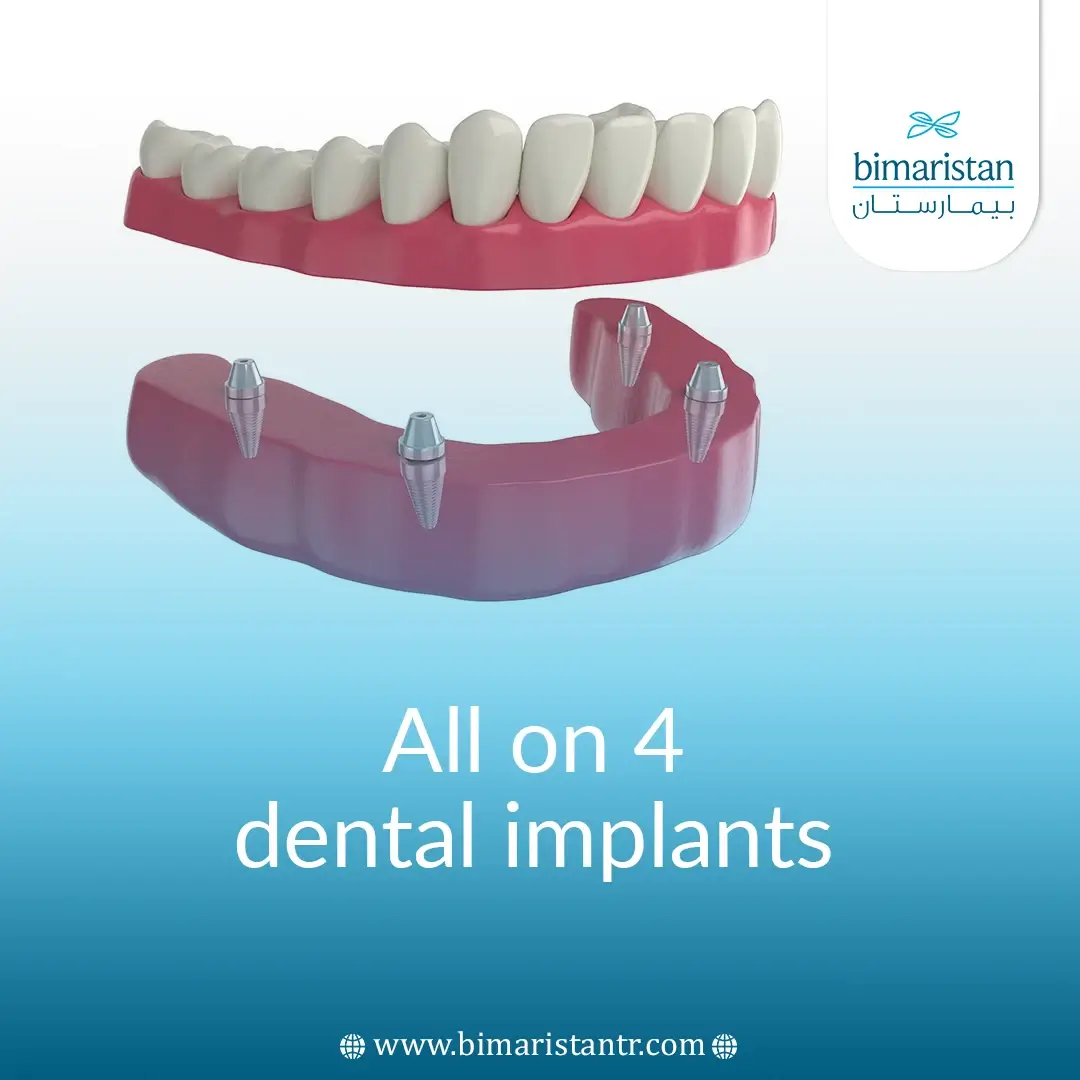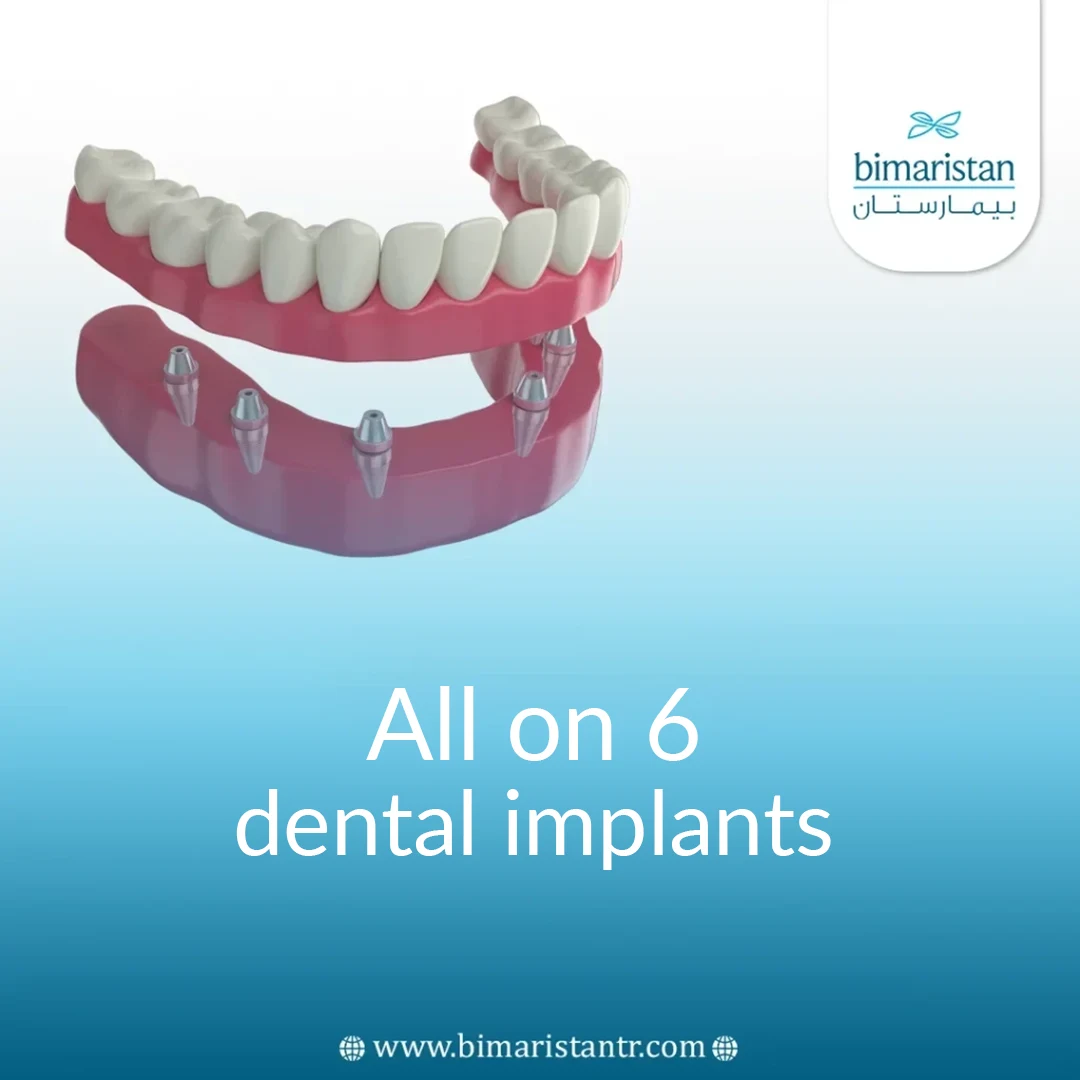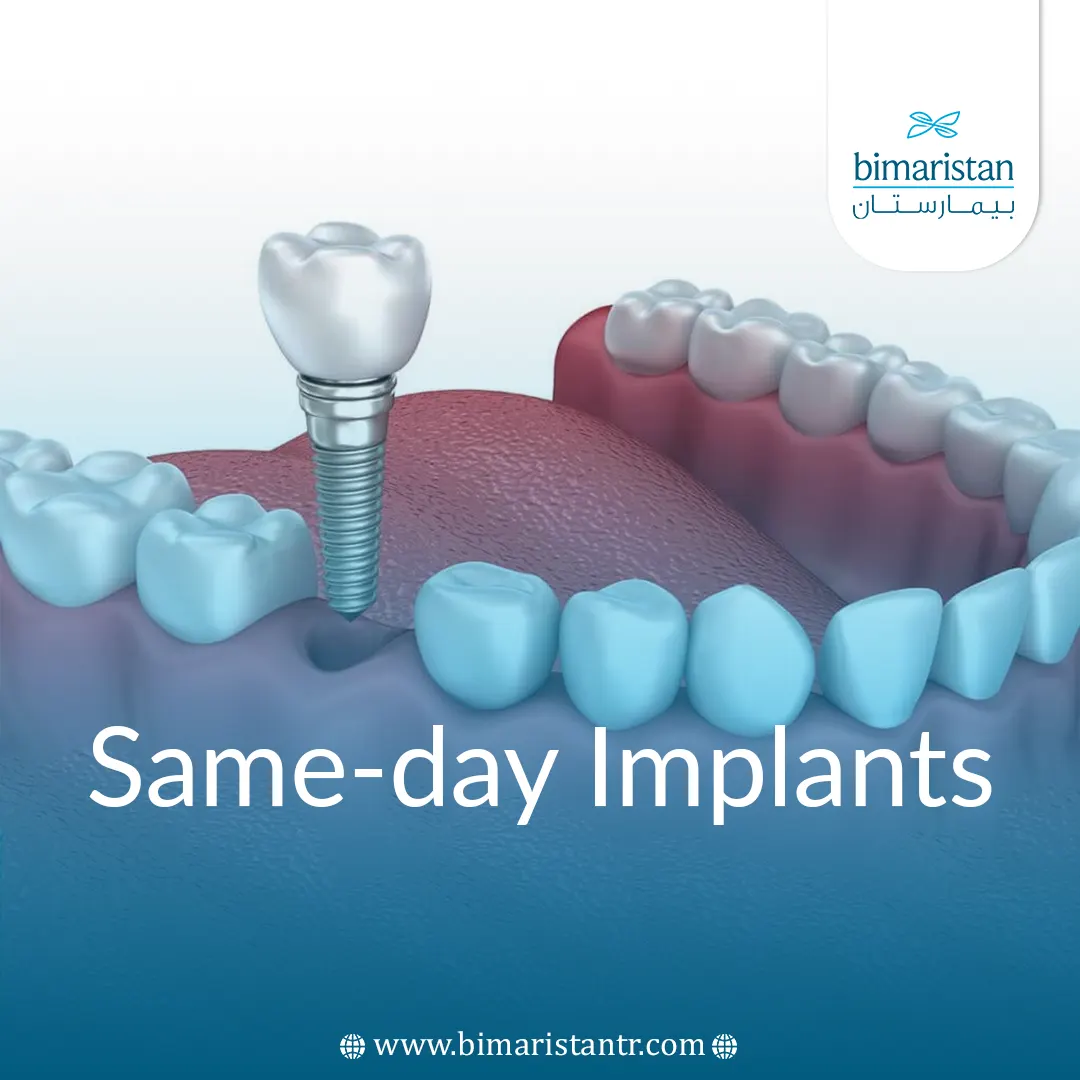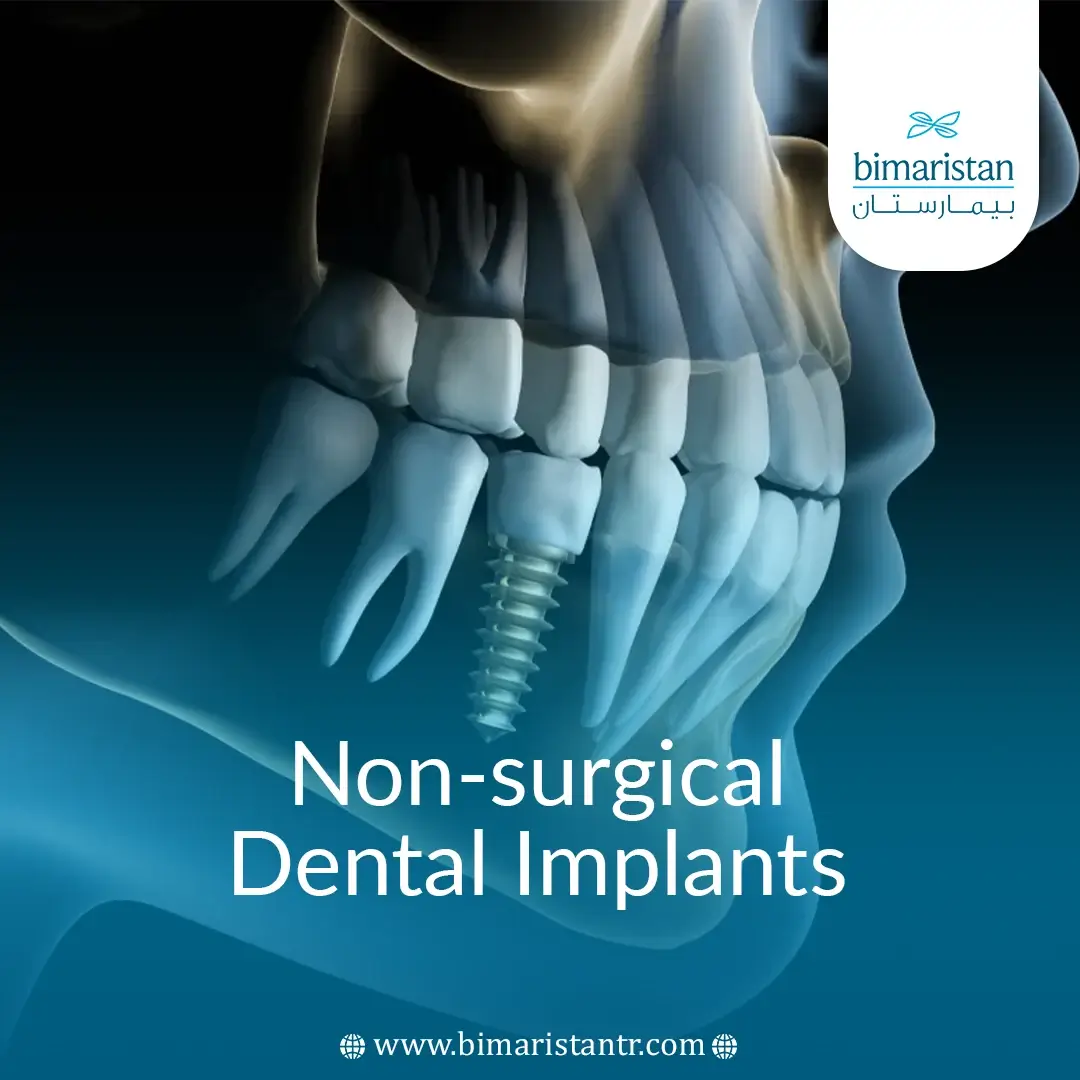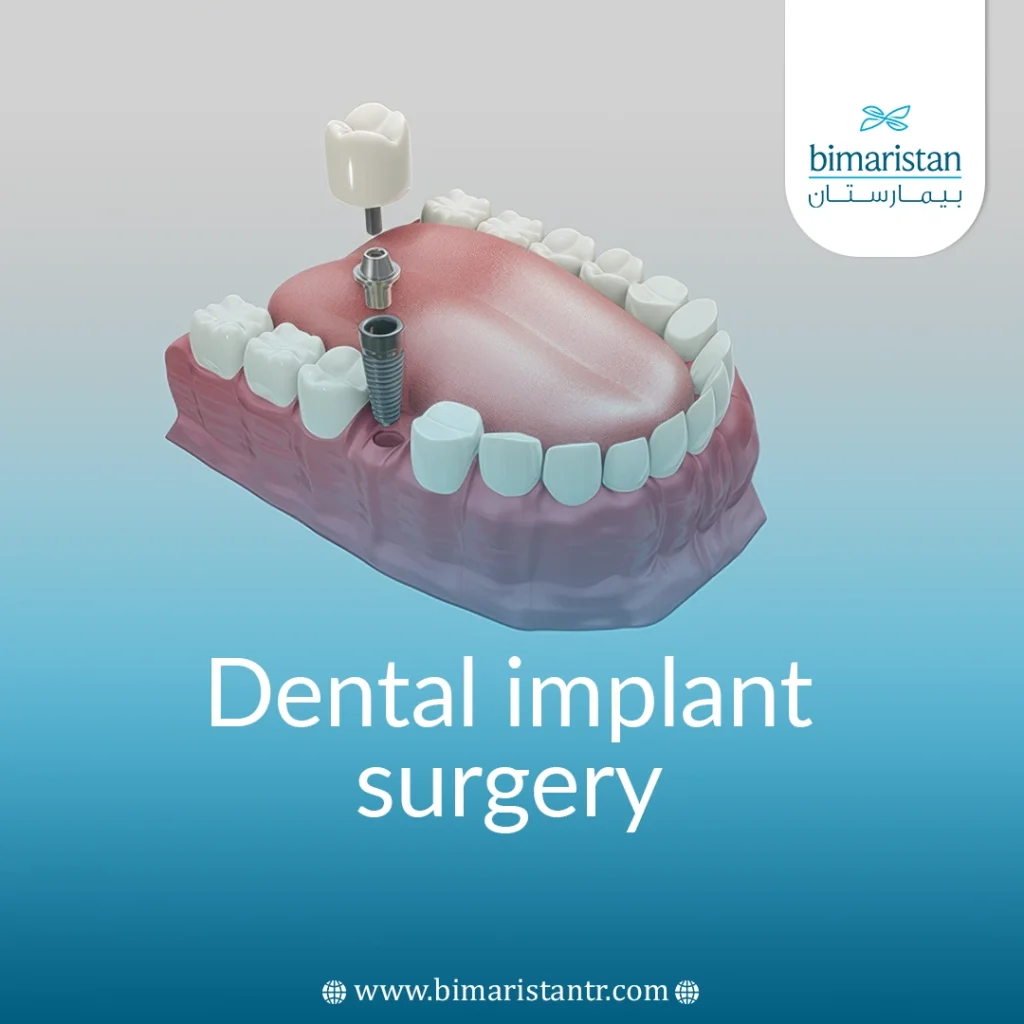Dental implant surgery in Turkey is one of the most common and advanced medical procedures in the field of cosmetic and therapeutic dentistry. Thanks to technological advances and modern techniques, it is possible to replace any missing tooth by installing metal implants into the bone, providing effective and sustainable solutions to tooth loss.
This surgery is accurate, efficient, and painless, making it an ideal option for many people looking to improve their quality of life and restore their natural smile.
What is dental implant surgery?
Dental implant surgery is a procedure in which artificial teeth are implanted into the bone and is often done when people have lost their permanent teeth, or when the teeth are too badly damaged to be repaired.
These artificial teeth are identical to natural teeth and are considered the best prosthetic option you can have for healthy, authentic teeth.
Dental implants not only help preserve the appearance of your smile but also maintain the overall structure of your mouth by helping to prevent other teeth from falling out. They also maintain the integrity of chewing and contribute to the preservation of the natural shape of the jaw.
Dental implants are made from a platinum metal implant that is anchored to the jawbone to provide a strong base for the artificial tooth or dental crown.
These teeth are the most similar in function and appearance to real teeth, making this type of surgery a great alternative to ill-fitting dentures or bridges.
This surgery can be performed in several steps depending on the type of implants that will be used and the health of your mouth and jawbone.
Preparing for dental implant surgery in Turkey
Since dental implants require multiple surgical procedures, your dentist or oral surgeon will perform a complete and thorough evaluation, including panoramic X-rays, CT scans, and dental models, to ensure that the implants match your natural teeth exactly.
Your dentist will then review the condition of your jawbone regarding the number of teeth you plan to replace with implants, this planning process can involve several types of dental specialists including a maxillofacial surgeon and a periodontist.
Your dentist will also want to know about any medical conditions you have and any medications you are taking, including over-the-counter medications.
Do you have any heart conditions or previous bone implants? If so, your dentist may prescribe antibiotics before surgery to help prevent infection.
Your doctor should know and discuss your surgical anesthesia options and which one may be best for you during the surgical procedure, the medical staff in charge of your surgery may also provide a list of things you should do before surgery.
If you haven’t already done so, arrange for a friend or family member to drive you to and from surgery because you won’t be able to drive yourself after the procedure.
Expect to be in “full rest” mode for the rest of the day following surgery and this may require you to make some advance arrangements.
Dental implant parts
A dental implant consists of three main parts:
The core part (the implant): Similar to the root of an artificial tooth, it is anchored inside the jawbone during the implant process and is the most important part.
Abutment: A small piece that connects the implant to the crown, extending slightly above the gum and acting as a foundation for the new tooth.
Crown: This is the artificial tooth that is placed on top of the abutment, and may be a single tooth, a bridge to replace several teeth, or a full denture.
Most dental implants are made of titanium, but there are also ceramic implants. Both materials are safe and biocompatible with oral tissues.
Why are dental implants done?
Tooth loss can affect your oral and digestive health, and it can affect both your psychological and social well-being. If you avoid smiling in photos or feel awkward while speaking, dental implants can help restore your self-confidence.
Clinical conditions treated by dental implants
Tooth loss caused by:
- Severe tooth decay.
- Cracked or broken teeth.
- Gum disease.
- Some teeth do not develop from birth (a condition known as “toothlessness”).
Are you a good candidate for dental implant surgery?
As dental implant and gum surgery specialists in Istanbul, we assess and determine your suitability for the procedure based on the following:
Bone thickness
When a tooth is missing and the surrounding bone begins to deteriorate, a certain density of bone must be present before the implant so that the abutment can fuse with it.
If a tooth has been missing for a while, there may not be enough bone for dental implant surgery. To determine this, we use a CBCT scanner.
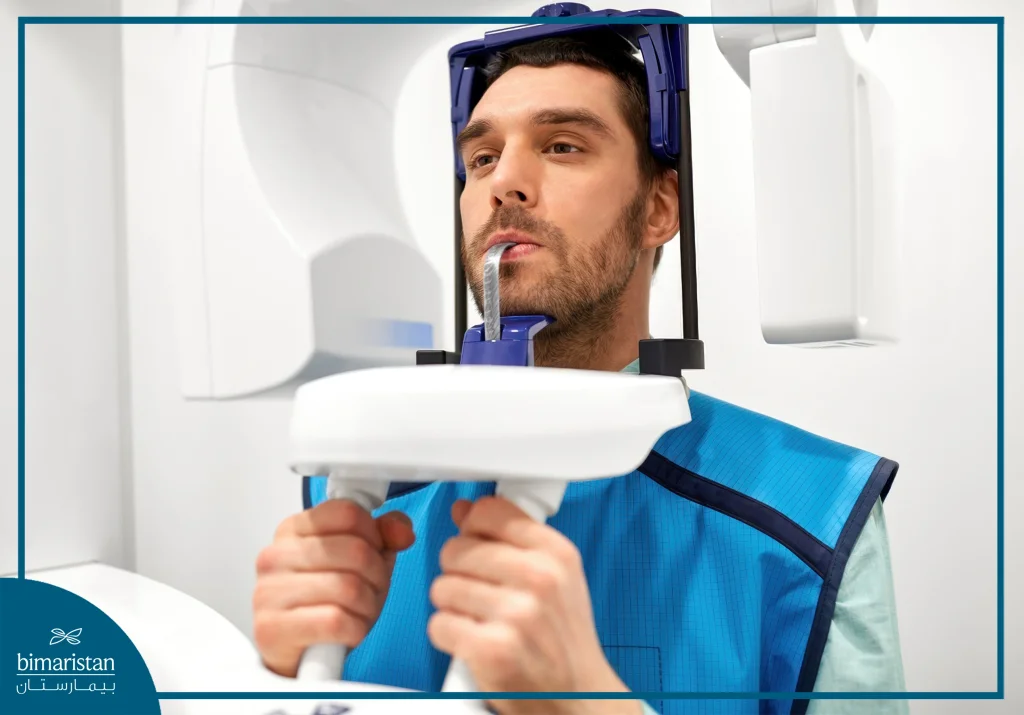
This modern technology gives us a 3D view of the mouth and jawbone so that we can assess the density and thickness of the jawbone, if there is enough bone then we can proceed with the implant without any fear.
If there is not enough bone for a dental implant, a bone grafting procedure is often performed as it can help the body regenerate bone and tissue.
When you have enough bone, you will be able to proceed with the surgery without this step.
If the bone is insufficient in some places and suitable in others, all-on-four implants have been developed to solve the delay caused by the bone graft.
Age
Dental implant surgery is more successful if it is done after growth has been completed.
If you or your child is very young, you may need to wait until your facial structure develops.
This is usually around 16 years old for girls and 18 years old for boys, in the meantime dentists can find a temporary solution for missing teeth until the jaw has fully matured.
Public health
Like most surgeries, general health and good oral health are required for dental implant surgery.
If you have certain conditions such as diabetes, are a heavy smoker, or have gum disease, dental implant surgery may not be viable.
Who shouldn’t get dental implant surgery?
Certain factors can reduce the chances of successful dental implants and stay in place.
You may not be a good candidate for dental implants if you:
- The smoker who has no intention of quitting
- You’ve had radiation therapy to the head and neck.
- Diabetes with irregular and uncontrolled sugar levels.
- The use of certain osteoporosis medications such as bisphosphonates can cause necrosis of the jawbone at the time of implantation.
How effective are dental implants?
Dental implants are very durable. For some people, implants last a lifetime. In general, dental implants have a 95% success rate or higher.
Details of dental implant surgery in Turkey
How do dental implants work?
The steps of dental implants vary from person to person and also depend on the method of implantation, but in general, they include the following stages:
The surgical stage: The dentist implants the implant in the jawbone.
Healing stage: This is where the bone and the implant are fused and takes an average of about three months.
Final crown placement: The dentist places the artificial tooth after the implant has healed.
Details of dental implant surgery
During surgery, the surgeon:
- Give you local anesthesia or sedation as needed.
- Making an incision in the gum to expose the bone.
- Prepare the bone using special medical instruments.
- Place the implant inside the bone with precision.
- Close the wound with stitches.
If the implant is in the front teeth, a temporary tooth will be placed to maintain the aesthetic appearance during the healing period.
These steps are the normal steps followed for traditional implants.
Recovery phase (osseointegration)
During this stage, the bone fully fuses with the implant in what is known as osseointegration, a process necessary to ensure the implant’s long-term stability.
Recovery time:
- It ranges from 3 to 9 months, depending on the speed of bone healing. It increases and decreases depending on the age and health status of the patient
- It may take longer in some cases.
- It may also take less time when using certain types of implants
Installing the final abutment and crown
Once the bone has healed, the dentist will attach the abutment and the prosthetic crown, bridge, or final denture.
This stage usually takes only about an hour, and may sometimes require additional minor surgery.
These stages are sometimes augmented by the extraction of the tooth if the tooth is irreparable and has not fallen out.
A bone graft may be done first if the bone is very weak and has little thickness. This decision was previously based on a panoramic image, but now a computed axial tomography (CBCT) scan of the jaw is preferred.
Dental implant surgery with bone restoration
Your current jawbone site for your implant may not be thick enough, or it may be too weak since your jaw exerts a lot of pressure while chewing, and the bone must be very strong to handle the chewing and protect the implant.
Depending on the structure of your jawbone, you may need to have a little extra bone to give the original implant site more rigidity. Your oral surgeon adds this bone through a process called bone grafting, where a small piece of bone or other material is implanted to help anchor the base of the implant within the jawbone.
If bone restoration is needed, the healing process can take at least four to six months before the implant is placed. While the implant is healing, you will wear a temporary denture to maintain the appearance of the entire tooth.
The set will be removable and must be kept clean at all times.
Different types of dental implants
Depending on the strength of your jawbone and your particular situation, there may be implant alternatives that can work well; these types can be used instead of traditional types of dental implants or even be used as a companion to implants rather than an alternative to them.
Common types of dental implant methods include the following:
Immediate dental implants (known as same-day dental implants)
Same-day implants allow you to walk out of your appointment with a full set of teeth without the delay usually required for healing. The teeth you initially receive are temporary until the implant site heals and you have a healthy bone connection to support the permanent restoration. This is a great way to get your smile back as quickly as possible.
All on four or six
This type is ideal for people who have lost most or all of their teeth due to decay or gum disease as it allows you to place implants without a bone graft using a set of temporary teeth that are placed on the same day or shortly thereafter.
Multiple implants
If you have several missing teeth resulting in larger gaps but you still don’t need to replace all of your teeth, you can use multi-crown implants only in areas with large gaps.
Non-surgical guided dental implants
Dental implants are done using a 3D surgical guide that helps guide the position of the tooth significantly compared to traditional implants, and the surgery here is simpler as the doctor does not have to lift a slice of gum in the area of the implant. The doctor does not need to see the bone. It is done without surgery.
You can also check out the Invisalign.
What usually happens after dental implant surgery in Turkey?
Discomfort is normal and expected after dental implant surgery Here’s what you can expect:
- Swelling of the face and gums.
- Bruising of the gums or skin.
- Pain at the implant surgery site.
- Slight bleeding.
If any of these symptoms worsen several days after surgery, contact your dentist or oral surgeon immediately, as they may indicate implant issues that need to be addressed by a specialist.
When should I call my dentist?
You should contact a doctor if you experience:
- Difficulty chewing, speaking, or opening your mouth.
- Swelling of the face.
- Severe tooth or mouth pain.
- Signs of gum infection, such as persistent bad breath, swollen or painful gums, loose teeth, new gaps between teeth, pus, or heavy bleeding.
Risks and potential complications of dental implants
Although complications are very rare with experience, some issues may occur such as:
- Implant failure is one of the most common complications
- Damage to neighboring teeth.
- Delayed bone healing.
- Gum or bone infections.
- Fractures of the jaw (very rare).
- Nerve injury is a major complication.
- Heavy bleeding.
- Sinus infiltration (in some cases).
- A rare allergic reaction to titanium. In this case, ceramic implants can be used as an alternative.
For best results, be sure to consult a specialist dentist rather than a general practitioner.
Tips to prevent implant failure
- Adhere to all practices that provide proper oral hygiene by brushing your teeth twice a day and making sure to floss in between.
- Make sure to make regular visits and checkups to the dental clinic to stay on top of your oral health.
- Avoid using tobacco products.
- Avoid bad oral habits such as chewing ice or hard candy.
Does health insurance cover dental implant surgery in Turkey?
In general, insurance companies do not cover all the costs of dental implant surgery and some insurance companies may not cover any of these costs, as health insurance policies vary, you should check with your insurance company’s financial department before starting any treatment, you can also find out if your dentist offers scheduled payment plans.
Dental implants are a great way to replace missing teeth with natural-looking artificial teeth.
The cost of dental implant surgery in Turkey in 2025
The cost of dental implant surgery in Turkey varies depending on the type of implant, the number of implants used, the method of implantation, and the type of veneers used. But in general, the cost ranges between 300 and 1500 USD per tooth.
| Type of implant | The cost of the implant |
| Swiss implant “strauman” | 800 – 1200$ |
| The best German implants | 500 – 900$ |
| The best turkish implants | 250 – 600$ |
| Italian instant implants | 400 – 800$ |
| 3D implants | 800$ |
Disadvantages of dental implants
Despite the many benefits of dental implant surgery in Turkey, there are some disadvantages and risks to consider before making the decision to get dental implants. Some of these disadvantages include:
- High cost: Dental implants are an expensive procedure compared to other alternatives such as partial or full dentures. The cost of an implant includes the price of the metal implant and the bridge or crown that is placed over the implant.
- Long treatment time: The dental implant process is time-consuming, involving multiple stages of examination, preparation, surgery, and healing. The entire process may take several months to get the final results.
- Surgical complications: As with any surgery, complications such as infection, bleeding, and nerve or sinus damage may occur, especially if the surgery is not performed properly.
- Need for additional surgery: In some cases, the patient may need additional procedures such as bone grafting or sinus lifting to provide a favorable environment for the implant.
- Incompatibility: Dental implants may not be suitable for all patients, especially those with chronic health issues such as uncontrolled diabetes or immune system issues, as these conditions can affect the body’s ability to heal.
- Failure to fuse: In some cases, the implant may fail to properly fuse with the surrounding bone, requiring removal of the implant and an attempt to reimplant after a period of healing.
- Allergies and reactions: Some people may be allergic to the materials used in the implants, which can lead to adverse reactions that require the removal of the implant.
Based on these disadvantages, patients should consult specialized dentists to assess their health condition and ascertain the suitability of dental implant surgery before making a final decision.
Sources:
